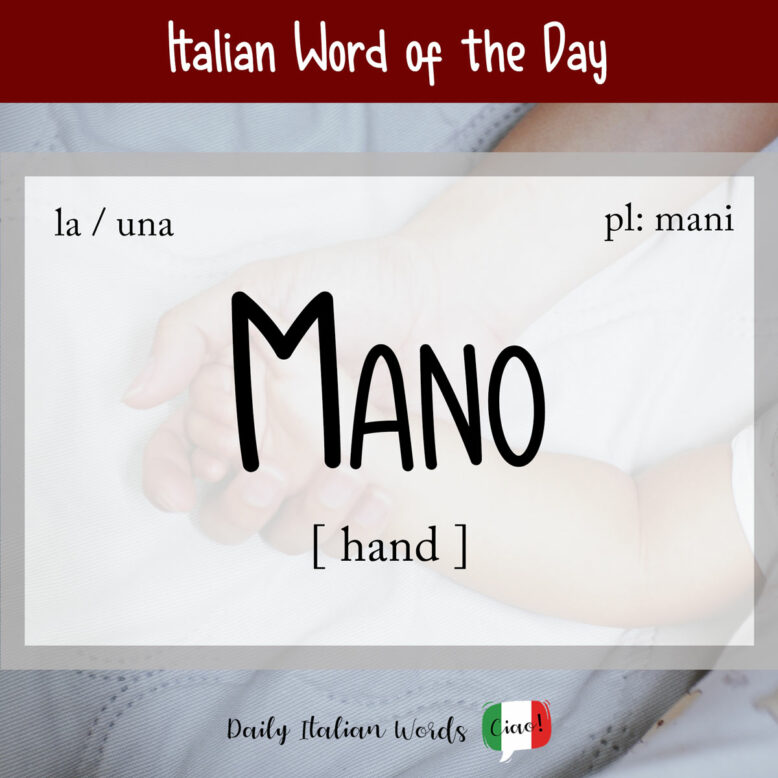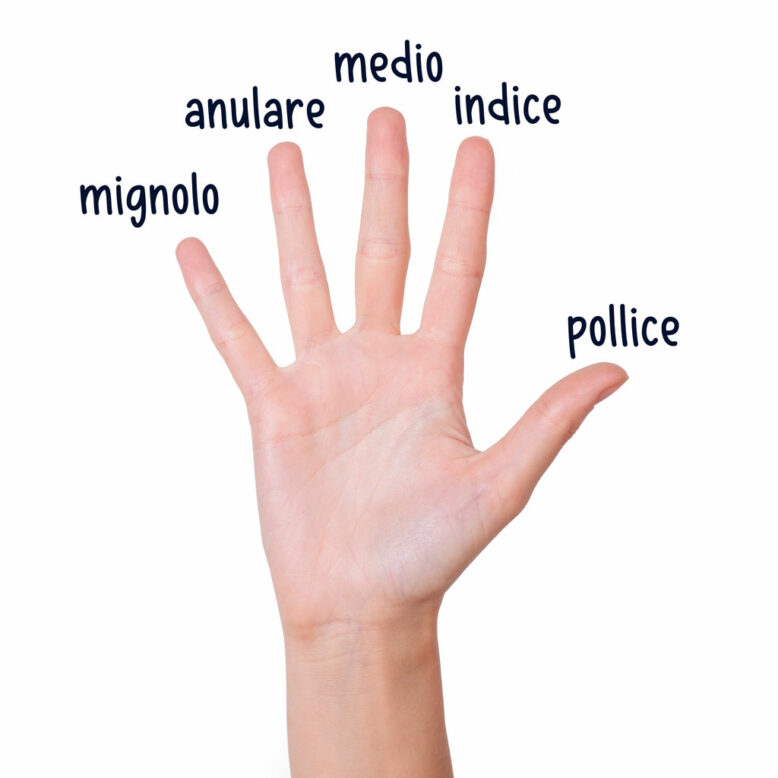Mano, which is the word for hand in Italian, has its origins in the Latin word manus, which also means hand.

A curiosity about this word is that, despite ending in the letter o (which is usually associated with masculine nouns) mano is actually feminine. This is because the Latin manus is a fourth-declension feminine noun that has retained its feminine gender not only in Italian but in every Romance language.
It takes the following definite and indefinite articles:
- la mano = the hand
- le mani = the hands
- una mano = a hand
- (delle) mani = (some) hands
Each hand has cinque dita (five fingers) which go by the following names in Italian: il pollice (thumb), l’indice (index), il medio (middle), l’anulare (ring) and il mignolo (pinky).

Other well-known parts of the hand include il palmo (palm), le unghie (fingernails), i polpastrelli (fingertips / pads), il dorso (back) and le nocche (knuckles).

Because hands play such an important role in how we manipulate objects and interact with the world, it should come as no surprise that the word appears in numerous compound nouns, adjectives and adverbs, many of which bear a close resemblance to their English equivalents. Here are just a few of the most common:
alla mano
easy-going
di mano in mano
little by little
di prima mano
first-hand, personally
di seconda mano
second-hand
lavare a mano
to hand-wash
stretta di mano
handshake
freno a mano
handbrake
bagaglio a mano
hand luggage
a mano libera
freehand
fuori mano
off the beaten track / out of the way
fatto a mano
handmade
sottomano
close at hand / secretly
mano nella mano
hand-in-hand
mano morta
touch up, feel up (someone)
mano d’opera
workforce
chiavi in mano
all-inclusive, turnkey
An expression you absolutely must learn if you want to speak like a native is man mano che (or mano a mano che). Although there isn’t a direct translation in English, it means something along the lines of “as [something] progresses”. For example:
Man mano che rendiamo il piatto più goloso, le calorie salgono.
The tastier we make the dish, the more the calories increase.
(lit. As we progressively make the dish tastier, the calories increase.)
In Italian, mano is often used in reference to one’s ability to do something. For example, the expression prenderci la mano (lit. to take one’s hand) means “to get the hang of something” whereas perdere la mano (lit. to lose one’s hand) means “to be out of practice / rusty” or “to lose the knack for something”.
Non mi dedico alla cucina da un po’. Spero di non aver perso la mano!
I haven’t done much cooking in a while. I hope I haven’t lost the knack for it!
It may also be used in the sense of helping or asking for help, as in the expressions dare una mano a qualcuno (to give someone a hand), allungare la mano (to ask for something / to beg) and tendere la mano a qualcuno (to lend someone a hand).
Mano also appears many other idiomatic expressions. Listing every single one would make this article too lengthy, but here is a small taster of those you are most likely to hear in your daily interactions with Italians:
- forzare la mano a (qualcuno) = to force (somebody’s) hand
- farsi prendere la mano = to get carried away with
- chiedere la mano di (qualcuno) = to ask for (somebody’s) hand
- alzare la mano = to raise one’s hand
- essere a portata di mano = to be close at hand, within reach
- essere lesto / svelto di mano = to be quick-handed
- metterci mano = to take action
- mettere mano al portafoglio / alla borsa = to pay one’s share, chip in
- prendere in mano la situazione = to take control of the situation
- sfuggire di mano = to get out of hand
- starsene con le mani in mano = to be idle, to twiddle one’s thumbs
- stringere la mano = to shake hands
- venire alle mani = to come to blows
Perhaps one of my favourite idiomatic expressions is avere le mani bucate, which literally translates as “to have holes in one’s hands”. It is used to describe someone who spends money without giving it a second thought.

In addition to its original definition, mano, like many Italian words, also has other meanings.
The first is hand in the sense of an artist’s style or workmanship.
The second is the side of the road, and consequently, the direction in which the traffic flows on either side. It is from this definition that we get the common expression andare contromano (to go in the wrong direction / against the flow of traffic).
Andava contromano in una strada a senso unico.
He was going the wrong way on a one-way street.
It is also the word for hand in a game of cards. For instance, a good hand would be translated quite literally as una buona mano.
Finally, mano is used in reference to a coat of paint. You might decide to put on a second coat of paint (una seconda mano) after the first, just to make sure the previous colour doesn’t show through.

Heather Broster is a graduate with honours in linguistics from the University of Western Ontario. She is an aspiring polyglot, proficient in English and Italian, as well as Japanese, Welsh, and French to varying degrees of fluency. Originally from Toronto, Heather has resided in various countries, notably Italy for a period of six years. Her primary focus lies in the fields of language acquisition, education, and bilingual instruction.


